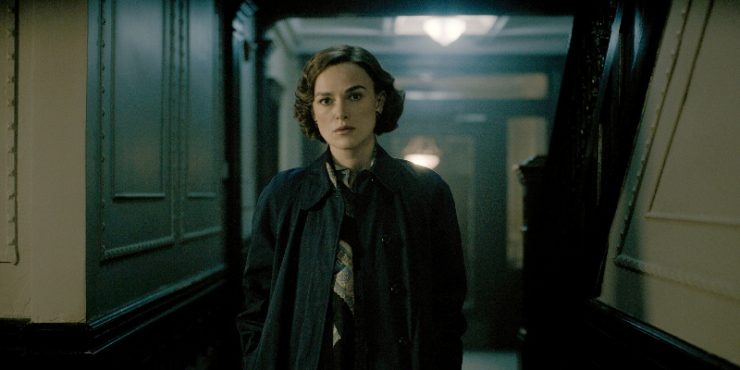We’ve all heard of stunt casting but nabbing the extremely British Keira Knightley to play a Boston-based investigative reporter in the 1960’s is one for the ages. We’ve spent twenty years cultivating an image of the English actress as a charming but reliably edgy presence in some of the best (and a few of the worst) British films of the past two decades. As real life Boston journalist Loretta McLaughlin, Knightley proves quite apt even if hearing her in an American accent does feel like science fiction. McLaughlin was a reporter for the Boston Record American whose coverage of the Boston Strangler murders is considered to be more thorough than even the police department at the time.
Writer-director Matt Ruskin frames this story through McLaughlin, specifically through her struggle to be taken seriously within the boys’ club of newspaper reporting. Confined to the lifestyle pages, Loretta is reviewing toasters when her main interest is a recent string of murders terrorizing the Boston area. Her editor, Jack MacLaine (Chris Cooper), has no interest in her tackling the crime story unless she agrees to do so off the clock. Only after she uses quality sources to scoop the local papers does Jack see the value in Loretta’s tenacious reporting. Jack brings on the more seasoned Jean Cole (Carrie Coon) to help Loretta navigate the politics of investigation, including the more tedious work of gathering intel and getting information from the tight-lipped police department.
As more women end up dead (all with similar stories: unforced entry, followed by a brutal murder and a stocking tied ornately around the victim’s neck), Loretta becomes convinced that she cares more about catching the Boston Strangler than the police do. She and Jean meet plenty of resistance, first from the police, and then by their own paper, as MacLaine doesn’t see the benefit of antagonizing the Boston PD. Loretta’s husband, James (Morgan Spencer), is initially supportive of his wife’s endeavors, but as the case takes up more and more of her time, his encouragement waivers. Only Detective Conley (Alessandro Nivola) shows interest in Loretta’s findings, but even his support dwindles as his own case load stacks higher and higher. As the years drag on, Loretta begins to feel like the only person keeping the ball rolling on the case, as thirteen women end up dead.
The Boston Strangler murders are still listed as a cold case, so the mystery still abounds. To make up for the lack of a true villain, Ruskin attempts to compare the day-to-day misogyny that Loretta and Jean face with the female-centered violence of the strangler himself. The notes here are a bit heavy-handed, distracting the forward momentum of the narrative as opposed to enhancing it. The film’s tonal and visual style owes much to David Fincher’s 2007 masterpiece Zodiac – perhaps too much. Fincher’s tale of obsession has more visceral interest in the actual murders, and plays upon the audience’s own perverse curiosities, while Boston Strangler‘s tactful, well-meaning approach leaves the film without much propulsion. The Boston journalistic setting may also remind some of Spotlight, but while Ruskin tries to court that film’s tight storytelling, the result ends up feeling slight in comparison.
Boston Strangler feels too stretched between its murder mystery and its feminist arc to be fully about either, and while Knightley and Coon both perform strongly in this film, Ruskin fails to appropriately weave their success as reporters with the biases they encounter within that time’s sexism. The film does offer a glimpse of a new road for Knightley to go toward; not specifically American characters but as harder-edged people less reliant on charm. Her performance is the highlight of the film, giving us a view of her that we’ve never seen before. Alas, the film does little more than showcase her, relying too heavily on tropes to make the suspense of the manhunt feel compelling. The film’s ending, meant to convey a moral failing on a larger scale, falls flat because the mystery was never Ruskin’s main interest to begin with.
Written and Directed by Matt Ruskin










